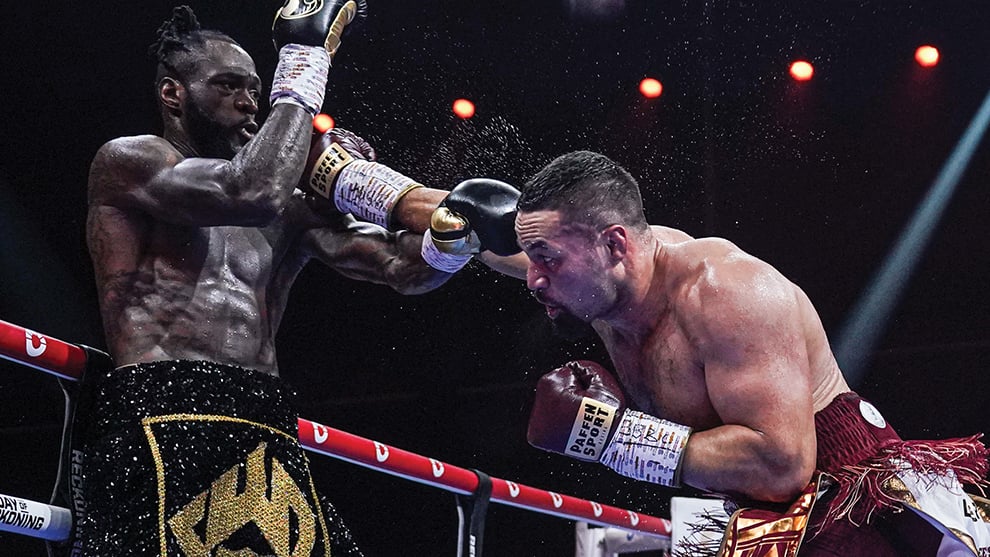By George Gigney
Broadcasts
BACK in October, we had to endure one of the most bloated boxing broadcasts in history when Tyson Fury and Francis Ngannou met in Riyadh, Saudi Arabia. On that show, there was under an hour total of actual boxing and about four times as much filler in between. So, ahead of the ‘Day of Reckoning’ show on the weekend before Christmas, there was plenty of concern among fans that it would be the same again. Thankfully that wasn’t the case. This card, topped by Anthony Joshua and Deontay Wilder in separate fights, included more big-name fighters and so there was more action to enjoy.
It began at a pretty fast pace; there were very quick finishes in some of the early fights but not much time in between them. For a spell, it looked like we might be treated to a well-paced event that kept our attention throughout. That didn’t happen, of course, as once the card moved into the latter stages, the gap in between fights grew larger and larger. There was a particularly long dead spell in between the Daniel Dubois-Jarrell Miller and Dmitry Bivol-Lyndon Arthur fights.
But it was undoubtedly an improvement from the Fury-Ngannou broadcast. We didn’t have to listen to random celebrities in attendance take stabs in the dark about who they think would win, although this time around there was a lot of attention on Cristiano Ronaldo, who once again sat at ringside looking like the world’s highest-paid hostage.
This card also threw into stark contrast another drawback of these Saudi Arabia events: what appears a lack of an exciting atmosphere inside the arena. The boxing on Saturday night provided loads of entertainment and a lot of stoppages, and a crowd in the UK or US would have been going wild. But there was almost no noise from those in attendance, at least none that came across on the broadcast. It makes for a flat viewing experience – it certainly doesn’t detract from the enjoyment of the boxing itself, but hearing raucous crowds for big shows like this is an important part of the package for viewers.
Fans in the UK had two different options to watch this PPV: DAZN or TNT Sports. Unfortunately for those who watched the DAZN stream, they were without any audio for the first 10 minutes or so of the Joshua fight. DAZN put the problem down to technical issues, but that is poor form for such a high-profile fight and card. Other than that, both versions of the broadcast ran very well. In between fights DAZN focused more on interviews with the likes of Devin Haney and Sunny Edwards, who were both ringside, while TNT had Carl Frampton, Anthony Crolla and later on Lennox Lewis (via video link) to provide analysis and discussion.
One of the highlights when it came to the production of the broadcasts was Richie Woodhall, who was commentating for TNT Sports. He’s developed an excellent rapport with fellow commentator Darren Fletcher, but what makes Woodhall such a valuable voice is his technical breakdown of fights. He is able to simply and succinctly outline for viewers what fighters are doing, and why it is (or isn’t) effective. He explained, in layman’s terms, how Dmitry Bivol’s timing and variety was too much for Lyndon Arthur, why Jai Opetaia was bringing his left foot round when launching attacks and how Joshua was able to dominate Wallin with ‘first and third’ boxing.
Anthony Joshua lands his left jab on Otto Wallin (Getty Images)
A shout out also needs to go to the production team, in particular whoever decided to play a clip of Dubois calling himself Miller’s “daddy” on the speaker system after his win, before then playing Daddy Cool by Boney M. Top-drawer trolling. It was also fun to see Frampton refusing to shy away from the fact that Miller is a drugs cheat.
There were a few topics that could have been explored more on the broadcast, though. The first is that a fight between Joshua and Wilder – once one of the most desired in the sport – is now dead and buried given Wilder’s loss and performance. It’s yet another example of waiting too long to make a superfight and it eventually all goes up in smoke. All those involved, on both sides, should be pulled up for their part in the fight not being made when it should have been.
Another topic that wasn’t really discussed is how this card actually affected Tyson Fury’s legacy. There’s an argument to be made that his reputation was damaged by the fact Wilder – a man he shared a hellacious trilogy with – was so easily beaten by Parker and Wallin – who gave Fury all sorts of trouble a few years ago – was demolished by Joshua. Perhaps a more reasonable way to view it is that what transpired on this card puts more pressure on Fury to perform at his best and beat Usyk when they meet in February in order to silence those now questioning his standing both in the sport now and within heavyweight history.
Wilder made some conflicting comments after his loss. In the ring immediately after the result had been announced, he very much sounded like a man ready to hang up the gloves. He spoke of still feeling happy and joyful despite the loss and, without any prompting, touched on how he is pleased with the financial investments he has made with his boxing winnings throughout his career. It wasn’t quite a firm ‘goodbye’, but it was close to it. Then, in a video he posted to social media a few hours later, he insisted that he’ll be back and that “this isn’t the end.”
If he did choose to retire now, he would be remembered as one of the most thunderous punchers the sport has ever seen. If he sticks around, that vaunted power would keep him a fascinating operator in the division.
